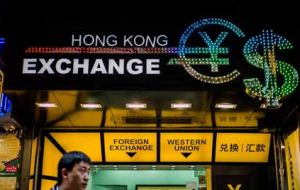MercoPress. South Atlantic News Agency
Hong Kong intervenes to weaken its currency, threatened by capital inflow surge
 Hong Kong has maintained its currency's peg to the US dollar for the past 30 years (Photo AFP)
Hong Kong has maintained its currency's peg to the US dollar for the past 30 years (Photo AFP) Hong Kong's central bank has intervened in financial markets again, weakening the value of its currency after it jumped in value. This follows similar moves on Sunday and pushes the total cost of intervention in the past week to 14.3bn Hong Kong dollars (1.85bn dollars).
Hong Kong limits the amount its currency can gain or fall to help maintain market and export stability. The bank said that it may have to keep intervening to keep its currency cheap.
This is because weak economic conditions in the US and Europe have prompted many investors to look for better-performing assets in markets such as Hong Kong.
“We expect net inflows into the Hong Kong dollar will continue for some time,” the Hong Kong Monetary Authority (HKMA) said in a statement.
“Since the US Federal Reserve's launch of the third round of quantitative easing, demand for Hong Kong dollars has increased and similar rises are also noted in other currencies within the region,” it said.
The Hong Kong dollar is pegged at HK$7.80 to one US dollar, but can trade between HK$7.75 and HK$7.85. Under the terms of the peg, the HKMA must intervene when the Hong Kong dollar hits either the upper or lower limit.
Hong Kong has maintained its currency's peg to the US dollar for the past 30 years.
While the peg has helped it steer its way through tough times, such as the Asian financial crisis in the late 1990s and the global financial crisis in 2008-09, questions have been raised about its effectiveness in the current global environment.
Critics have argued that by being linked to the US dollar, Hong Kong's monetary policy is heavily influenced by that of the US. They say that given the difference in the economic conditions between the two, this is not in the best interests of Hong Kong.
The US economy has been going through a rough patch. In a bid to boost growth, it has maintained interest rates at between zero and 0.25% since December 2008.
Given its currency peg, Hong Kong has also had to keep its interest rates low, not least because higher rates would be likely to result in a surge in capital inflows to the territory and put pressure on its currency.
Analysts say the peg and the resulting low interest rates have played a role in the recent boom in housing prices in Hong Kong, raising fears of asset bubbles being formed.




Top Comments
Disclaimer & comment rules-

-

-

Read all commentsCommunists!
Oct 25th, 2012 - 07:22 pm 0Interventionists!
What about the “Free Market”?
:-)))
keep your currency low, in relations with the dollar, and your products will be cheaper. That is the case with china. China has Billions(probaly) of dollars or their currency in America, and they keep it there so their currency stays low, thus their products are cheap. Chinas economy is very powerful, and if they wanted i could be the top currency, but that would make their products very expensive, thus they wouldnt sell alot and their exports fall. It is great Short-Mid-and even long term policy. But it will probally fail if they dont take the necesary precautions.
Oct 26th, 2012 - 01:47 pm 0#1 All the Asian Tigers have been more interventionist than the propaganda would have you believe, even the Cold War ROK and ROC...
Nov 01st, 2012 - 01:52 pm 0Commenting for this story is now closed.
If you have a Facebook account, become a fan and comment on our Facebook Page!